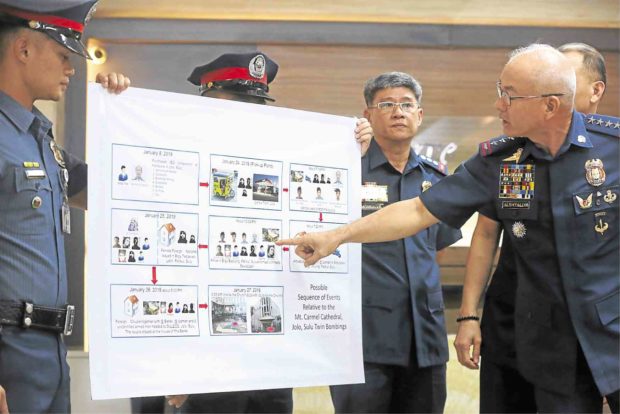
FORCED TO SURRENDER PNP Director General Oscar Albayalde says the five bomb suspects surrendered because they didn’t want to die in the ongoing military offensive in Sulu. —NIÑO JESUS ORBETA
A senior Abu Sayyaf operative and four members of the terror group believed to be behind twin blasts at a Catholic church in Jolo, Sulu province, that killed 23 people and wounded nearly 100 others on Jan. 27 surrendered to authorities on Saturday, the Philippine National Police chief said on Monday.
Kammah Pae, alias Kamah, whom investigators believe to have aided an Indonesian couple in the attack on Our Lady of Mount Carmel Cathedral in the Sulu capital, gave himself up to avoid being killed in a combined military-police operation launched after the bombings, according to PNP Director General Oscar Albayalde.
“He was forced to surrender,” Albayalde told a news briefing at PNP headquarters in Camp Crame, Quezon City. “He probably didn’t want to die during the military offensive.”
Pursuit in Patikul
Government forces killed three Abu Sayyaf gunmen and lost five of their own in fierce jungle fighting at Patikul, Sulu, on Saturday as they pursued the terror group behind the church attack.
Albayalde said the five suspects who surrendered belonged to the Ajang-Ajang, a 22-member Abu Sayyaf subgroup led by Hatib Hajan Sawadjaan believed to be responsible for the bomb attack on the Jolo cathedral.
The PNP chief said Kamah denied involvement in the twin bombings, but witnesses’ accounts showed the latter escorted the Indonesian couple to the church.
Security forces also found an improvised explosive device and a jeepney allegedly used in transporting the still-unidentified Indonesian couple in Kamah’s home, Albayalde said.
The four others who surrendered also had admitted to some “participation” in the attack on the Jolo cathedral, he added.
Albayalde identified the others who surrendered as Albaji Kisae Gadjali, alias Awag; Rajan Bakil Gadjali, alias Rajan; Kaisar Bakil Gadjali, alias Isal, and Salit Alih, alias Papong.
Multiple murder
Police were bringing multiple murder charges, among other accusations, against the five suspects in the office of the Sulu provincial prosecutor on Monday, Albayalde said.
He said 14 other Ajang-Ajang members remained at large, including Sawadjaan, believed to be the mastermind of the attack on the Jolo cathedral.
Among those at large with Sawadjaan, he said, are Makrim Habbisi, alias Makrim; Barak Ingug, alias Barak Abdulgani; Usman Aka Ubin and a certain Puti.
Aside from the Indonesian couple, another suspect in the twin bombings, Ommal Yusop, was killed in the military-police operation to get Sawadjaan in Patikul on Jan. 29, Albayalde said.
Quoting the surrenderers’ testimony, Albayalde said Sawadjaan provided the funds for the Jolo attack.
Puti and Alih bought the materials for the bombs, which Usman and a certain Muksin assembled in Barangay Latih, he said.
Bombers taken to Sawadjaan
Albayalde said the Indonesian couple arrived by boat in Jolo on Jan. 24 and were transported by the Gadjalis to Barangay Langhub in Patikul, where Kamah, Ingug, Habbisi and Usman met them and took them to Sawadjaan to plan the bombing.
He said the Indonesian man had hidden in the south for about a year, while the Indonesian woman entered the south only recently.
Albayalde said the Gadjalis drove the couple to Jolo on Jan. 26.
The next morning, the couple attacked the Jolo cathedral.
Information about the Indonesian couple first came from Interior Secretary Eduardo Año on Friday.
Albayalde confirmed the information on Monday, saying the Indonesian woman, “a suicide bomber,” detonated the first bomb inside the cathedral as Mass was being celebrated, while the man set off the second bomb outside the church.
Police said the attack was planned since last year.
Albayalde said the explosives used were powerful pipe bombs, packed with ammonium nitrate, TNT and other chemicals that have been used by the Abu Sayyaf in past attacks.
Indonesian gov’t help
Año said on Sunday that the Philippine government had sought help from the Indonesian government in identifying the bombers and had received assurance of assistance.
But Arrmanatha Nasir, spokesperson for the Indonesian foreign ministry, said the government had not been able to confirm the involvement of Indonesian nationals in the Jolo attack.
The Islamic State (IS) jihadi group in Iraq and Syria claimed responsibility for the Jolo attack on Jan. 28, saying through its news agency Amaq that two suicide bombers carried it out.
The Philippine authorities’ pointing to an Indonesian couple as the bombers would be consistent with the IS claim, and a shift from the military’s rejection of IS presence in the country.
Albayalde, however, said local terror groups were carrying out attacks only to gain notoriety and affiliate themselves with IS only to get funding. —REPORTS FROM CATHRIN GONZALES, JAYMEE T. GAMIL, WIRES